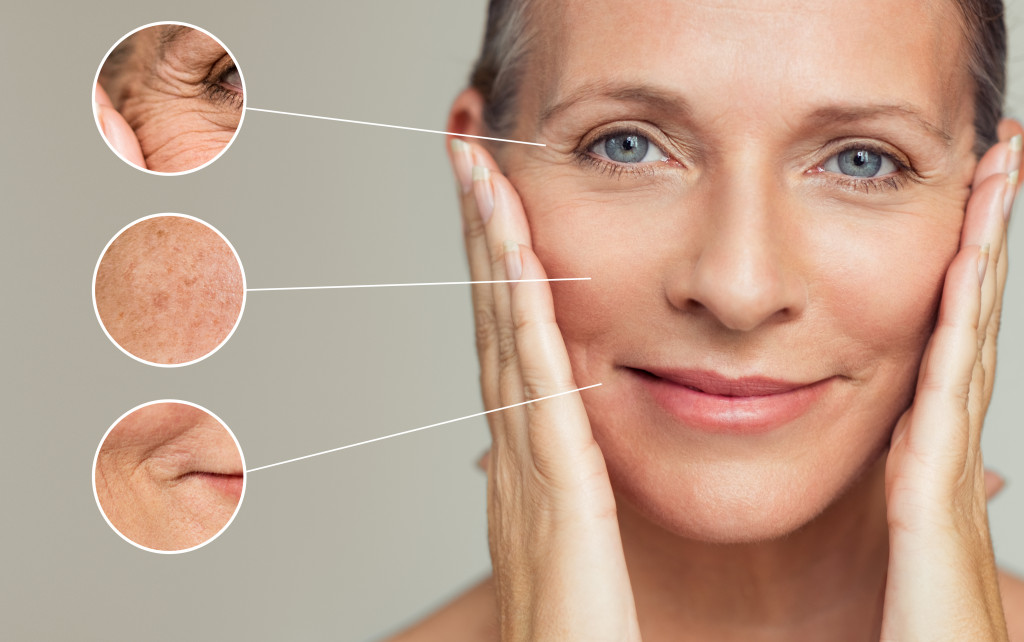- Collagen, a vital protein, plays a key role in maintaining skin firmness, elasticity, and resilience.
- Decreased collagen production with age leads to skin issues such as sagging, thinning, and dryness.
- Collagen’s role in skin hydration and healing influences the appearance and health of the skin.
- Consuming collagen-rich foods and supplements can help replenish collagen levels in the body.
- Cosmetic treatments and products that stimulate collagen production can combat skin loosening.
The human skin is one of the most resilient organs of the body. It helps protect people from harmful substances in their environment while being soft and sensitive to touch. It’s also a sign of a healthy body and is crucial in maintaining overall health. However, it’s inevitable for the skin to loosen up for various reasons. One common reason is the lack of collagen in your body. Here’s an in-depth look into collagen, how collagen is related to loose skin, and ways to improve your skin’s collagen levels.
I. What is Collagen?
Collagen is a protein abundant in the human body, found in the skin, bones, muscles, and tendons. The body’s primary structural component, often called the ‘glue,’ holds everything together. In the skin, collagen contributes to firmness, suppleness, and constant renewal of skin cells. It’s also vital for skin elasticity, helping it to appear youthful and healthy.
Despite being naturally produced by our bodies, collagen production tends to decrease with age and external factors like exposure to UV rays and consumption of sugar and refined carbs. This reduction can lead to skin sagging and the formation of wrinkles, underlining the importance of maintaining optimal collagen levels.
II. How is Collagen Related to Loose Skin?
The link between collagen and skin elasticity is profound. Here are four ways collagen is related to loose skin:
A. Elastin Breakdown
Elastin is another vital protein in the skin that works with collagen to provide firmness and elasticity. However, as collagen levels decrease, the elastin fibers in the skin can break down. This breakdown, combined with the reduced collagen production, can result in a loss of skin elasticity, leading to sagging or loose skin. Therefore, it’s crucial to maintain both collagen and elastin levels for overall skin health and firmness.

B. Thinner Skin
As collagen production decreases, skin can become thinner and more prone to damage. Collagen acts as a support structure for the skin, and when this structure becomes weak, the skin can begin to thin out. This thinning leads to loose, sagging skin and makes the skin more susceptible to tearing and bruising. Thinner skin may also appear more translucent and pale, and blood vessels underneath the skin may be more visible. Therefore, maintaining healthy collagen levels is essential to prevent skin thinning and to keep the skin resilient and robust.
C. Reduced Hydration
Collagen plays a significant role in skin hydration. As we age, collagen production decreases, and our skin can become dehydrated, leading to dryness and dullness. Dehydrated skin can appear loose or saggy as it lacks the plumpness and firmness that hydrated skin possesses. By maintaining optimal collagen levels, you can help keep your skin hydrated and reduce the appearance of loose or sagging skin.
D. Delayed Healing
Collagen is crucial in the body’s healing process, as it helps repair damaged tissues and promote wound healing. When collagen levels are low, wounds may take longer to heal, leading to scars that may contribute to loose skin. It’s essential to maintain proper collagen levels for efficient wound healing and to reduce the appearance of scars, which can contribute to skin sagging.
III. Ways to Improve Collagen Levels
While it’s natural for collagen production to decrease with age, there are ways to help boost collagen levels in the body. Here are some tips:
A. Collagen-Rich Food
Integrating collagen-rich foods into your diet can significantly replenish collagen levels in the body. These include bone broth, a hearty liquid made from boiled animal bones and connective tissues, which is a direct source of collagen.
Fish and shellfish, particularly their skins and scales, are also abundant in collagen. Furthermore, chicken, often used to produce supplements, is another excellent source of this essential protein. For plant-based options, foods rich in vitamin C, such as citrus fruits, strawberries, and bell peppers, promote collagen production as this vitamin is a necessary co-factor in collagen synthesis. Lastly, legumes and beans, being rich in protein, provide the amino acids necessary for collagen formation. Therefore, maintaining a balanced diet with these foods can help support the body’s collagen production.

B. Supplements
Collagen supplements, available in pill, powder, and drink forms, can also help maintain optimal collagen levels. These supplements contain hydrolyzed collagen, broken down into smaller particles that the body can absorb more efficiently. However, it’s essential to consult a doctor before incorporating supplements into your diet and to ensure they are from reputable sources.
C. Skin Treatment
When all else fails, there are various cosmetic options you can do. There are well-researched skin tightening treatments that can help stimulate collagen production. These procedures use heat to target the deep layers of the skin, promoting collagen renewal and tightening loose skin. Additionally, some topical creams and serums contain ingredients like vitamin C and retinol, which can help boost collagen production in the skin.
Collagen is vital for maintaining healthy, youthful-looking skin. As people age, collagen production decreases, leading to loose and sagging skin. However, by understanding the link between collagen and loose skin, incorporating collagen-rich foods into your diet, or taking supplements, you can help maintain optimal collagen levels. Additionally, practicing proper skincare habits and seeking professional treatment can also aid in promoting collagen production and prevention.

